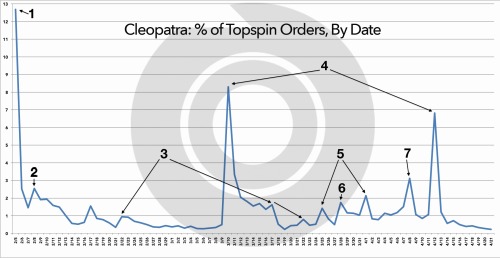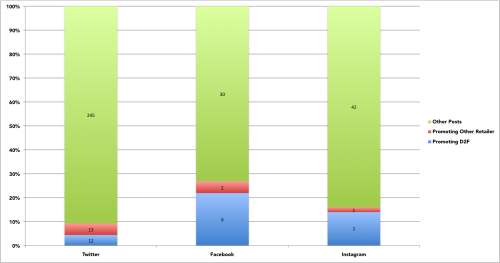Following a two month pre-order campaign, The Lumineers latest album Cleopatra debuted at #1 on the Billboard 200. Here we look at how the band’s careful use of social media over that two month period contributed to their massive success.
______________________
Guest Post by Jim Wallis on Topspin
Artists who best succeed on social media understand that it works best as a conversation, not a sales pitch- as a place to offer a look behind the scenes and connect with fans, not to bombard them with calls to action. When releasing a new record, the challenge is to maintain this balance while also leveraging the following that has been built up on Twitter, Facebook, Instagram and elsewhere to promote the release and drive sales.
After a two month preorder campaign, The Lumineers’ new album Cleopatra was released on April 8th via Dualtone Records and debuted at #1 on the Billboard 200. The band took thousands of direct-to-fan preorders for the album, placed through Topspin widgets embedded at thelumineers.com and shipped from our Topspin Fulfillment warehouse in Kentucky. The band used their considerable following on Twitter (435k), Facebook (2.2 million) and Instagram (220k) to announce news about the album, share their own excitement and insight into the process, and interact directly with fans. In moderation, they also used it to point fans in the direction of the direct-to-fan offers on their home page and to individual product pages, through posts synchronized across the three platforms- to great effect.
With this mind, we took a look at the entirety of their social media posts across these three platforms, from the campaign’s launch on February 5th to 2 weeks after the album’s release and compared them with their Topspin sales over the same period, as well as getting some insight from Grant Hathaway from The Lumineers’ management, Onto Entertainment, along the way. Here’s what we saw…
[See a larger version of this graph here]

[Click on the title of each section to see an example post]
For all the valuable planning that goes in to creating momentum across an entire presale campaign, the highest proportion of sales can often come right at the beginning, as fans experience the initial excitement of the album’s announcement. In this case, 12.7% of all orders were placed on day 1- the highest daily total. It’s a reminder, if one were needed, to make sure all the pieces of the puzzle are in place before launching a campaign. In the lead up to the launch, the band also posted several images with no comment other than a link to their website- including what was later revealed to be the album coverand a tracklisting on a mixing desk– to help build anticipation.
2 – Tour Announcement + Presale Access
In an era of declining sales, it’s well-documented that one area of the industry bucking the trend is live sales. Bundling album preorders with ticket presale access is a reliable way to increase sales and so it proved here: on the 4th day of the campaign, a post letting fans know that preordering the album would give them access to presales for the band’s world tour coincided with a 75% increase on the previous day’s preorders.
3- Posting Product Images & Videos
Interspersed around other, bigger announcements, the band posted several images and videos of the vinyl editions of the album and the deluxe lyric book, along with direct links to the relevant products on their site, each of which saw a tangible increase in sales. The key elements of these were that the images themselves looked great and that the tone was in keeping with the band’s other posts, rather than being overtly sales-y. Grant Hathaway, from the band’s management, told us: “We really wanted to showcase the vinyl packaging, as it really is something special. I created gifs and made sure to take a ton ofreal-life photos of these items so that fans could really visualize the products.”
4 – Incentivising With Limited Editions
After the initial launch, the two biggest spikes in orders came when the band promoted the limited edition vinyl version of the album on social media. At 2500 copies, the run was limited enough to appeal to fans, but large enough to generate a significant number of sales. Limited edition items give fans a reason to buy sooner rather than later, improving week 1 sales and the chances of a strong chart performance.
Grant Hathaway: “We really saw a reaction and spike in sales when we were able to create a sense of urgency around a product: the limited edition starburst vinyl was a great example of this. We really worked on our social media verbiage to create this urgency. Specifically, we focused on verbiage like, “The next 2500 orders will receive the limited edition starburst vinyl” rather than simply stating “There are only 2500 copies of the limited edition starburst vinyl available.” By simply focusing on “the next”, we really feel like we pushed folks over the edge into making a purchase with a sense of urgency in order to receive the limited edition starburst vinyl. The first time we posted with this verbiage, day-on-day sales increased by 1500%.”
As expected, the increased activity and attention brought by the release of each new track ahead of the album (3 tracks in total- each of which was available to download for fans who preordered) translated into an increase in preorders.
A friendly reminder to fans that this was their last chance to make sure they’d have the album on release day resulted in a 252% increase in day-on-day sales, with fans not wanting to miss out.
Having seen the effect of the band’s social posts, we also took a look at what proportion of their overall posts on Twitter, Facebook and Instagram directed fans to their D2F offers (and to other retailers) across this period and considered what this tells us about each platform…
[See a larger version of this chart here]

[For Twitter, replies are not included here- only what a follower would see. Also, tiled Instagram posts are counted as a single post.]
The band posted more links to their D2F store and other retailers on Twitter than on Facebook and Instagram combined but, proportionally, they were less than 10% of their total tweets- a significantly lower portion than the other platforms. Because Twitter lends itself to a larger volume of posts, it’s possible to have more promotional posts without it feeling like too many.
The inability to include URLs in Instagram posts meant that although the total number of posts on the platform was higher than Facebook, there were fewer posts explicitly promoting the preorder. The band’s team increased the chances of fans seeing their promotional posts on Facebook with paid advertising. Grant Hathaway: “We ran tons of sponsored posts on Facebook, mostly from our label, Dualtone Records. At this point, it’s pretty tough to reach the folks that actually “like” your Facebook page without paying to promote your posts. Unfortunately, it’s a necessary evil. Something that worked great for us was uploading video content natively to the Facebook platform. From there, you can target the viewers of that video with an ad- preferably regarding the content in the video.”
One other effective technique that the band employed on non-promotional Facebook posts on several occasions was to respond to fans in the comments section with links to the preorder: these were totally natural interactions, but still helped to direct any fans reading the comments to the preorder.
Grant Hathaway: “This time around we really worked with our social media team, Ride Or Cry, to dive into each social media platform individually. Rather than posting the same content on every platform, we found that if we focused on what each network did well, our posts were much more effective. Facebook is great for video content, gifs and longer form descriptions; every Friday we posted a song that inspired the band and wrote a paragraph or two about it (not something you could get away with on Twitter.) Instagram needs to be “artsy” and graphics need to be engaging. Twitter is short and snarky- we communicate (by replying) with our fans a ton on Twitter.”
Ultimately, at the heart of these tailored approaches to each platform, much of the content shared the same goal: driving fans to the band’s website, thelumineers.com. The home page acted as a hub for the campaign, pulling together the latest and most important news, music, tour dates, and preorder offers. Summarizing the campaign, Grant underlined the importance of this:
“One thing that really worked well for us on this campaign was providing a single link with all of the purchase details, streaming options, merch items and tour dates. For us, this meant organizing the front page of www.thelumineers.com in a way that outlined all of these options in a clean and easy-to-understand way. In the heat of a campaign there are too many links that need to be given proper attention- from specials with retailers, limited edition products on your D2F store, tour date on-sales and pre-sale verbiage, etc. This tends to be too much for social media and too overwhelming for the fan. We were able to create a splash page on www.thelumineers.com that really organized the information and links in a way that didn’t confuse fans. That way, we could serve each social media platform with content that made sense, all the while linking back to one central site, www.thelumineers.com.“
Aside from sales, an important outcome of directing fans from social media to the band’s website and through the direct-to-fan offers was that they captured thousands of new email addresses along the way, as social media followers not already on their mailing list opted to sign up for email updates during purchase- invaluable data that will be added to the band’s six-figure mailing list and utilized for future campaigns. Last but not least, Grant also stressed the band’s commitment to direct-to-fan:
“We really wanted to give fans the option to purchase directly from our store. We only offered the limited edition vinyl on our Topspin store. We were linking everyone to www.thelumineers.com and wanted to make sure the store was visible on the site and folks knew they had the option to purchase directly from us. It seems more conversational when folks purchase directly from your store, rather than going to iTunes or Amazon.”
You only have to look at their interactions with fans on social media to see the strength of the connection The Lumineers have with their fans. Their focus on direct-to-fan is both a cause and an effect of this, giving fans the opportunity to support them directly and to pick up exclusive products and packages while doing so, all the while capturing more and more data about their fanbase. It’s helped to set the band up for their worldwide success to date- and puts them in a great position to continue this for years to come.
Cleopatra is out now. Listen to it here.